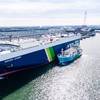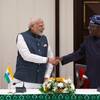Russia, Ukraine Examine Gas Plan To Avoid Winter Supply Crisis
Russia and Ukraine agreed on Monday to examine a payment plan to settle Kiev's multi-billion gas debts and fix a price for supplies until June 2015, offering the promise of averting an energy crisis over the crucial winter period.
The argument over prices for natural gas has added to tensions as the two countries have squared off over Moscow's seizure of Ukraine's Crimea peninsula and over a pro-Russian rebel uprising in eastern Ukraine.
Russia's Gazprom had been threatening to cut off Ukraine's gas on Tuesday, with potential knock-on effects for the European Union because much of the gas it receives from Russia is pumped via Ukraine.
But the immediate threat of a supply disruption was avoided after Kiev paid a first instalment, prompting Gazprom on Monday to grant it a week's grace.
Since a pro-Moscow president was toppled in Ukraine in February,Russia has demanded a sharp increase in the price Ukraine pays for gas. Kiev says it cannot afford it and wants to pay a discounted price that it negotiated in the past.
While the dispute has gone on, Gazprom has continued billing Kiev at the higher rate. It says Ukraine already owes it more than $5 billion in unpaid bills and is running up more debt at a rate of more than $1 billion per month.
Late on Monday, after some six hours of talks brokered by the European Commission, Energy Commissioner Guenther Oettinger said the CEOs of Gazprom and Ukraine's Naftogaz had agreed to consider a plan that could avoid price disputes recurring over the European winter when demand peaks.
"My request and my expectation is that we come up with a package that covers the period until June next year," Oettinger told reporters.
He did not disclose details of the price being considered, saying only that it was less than the $485 per 1,000 cubic metres Russia has demanded and more than the $268.50 on which Kiev has been insisting.
A further round of three-way talks brokered by the Commission could be held at the end of this week or next week, Oettinger said.
LAST MINUTE PAYMENT AVERTS CRISIS
After Kiev paid Moscow $786 million as a partial payment, Gazprom announced a six-day extension of the deadline until June 9. Gazprom also said that it would not sue Ukraine's gas supplier Naftogaz over unpaid bills during the coming week.
That means gas will continue to flow to Ukraine and Europe while President Vladimir Putin and other world leaders - including Ukraine's new president-elect Petro Poroshenko - are in France this week for events commemorating the allied forces' "D-Day" landings in Normandy during World War Two.
The Kremlin has not announced any plans for talks with Poroshenko or U.S. President Barack Obama during Putin's visit on Thursday and Friday but has said it cannot rule out the possibility of informal meetings. They are all expected to attend a lunch on June 6.
Putin has pulled back some of the tens of thousands of troops he had massed on Ukraine's border and says he is prepared to work with Poroshenko, who won a landslide presidential election a week ago. But the past week has also seen increased violence in eastern Ukraine.
The delicate negotiations over gas supplies provide the economic backdrop for the crisis in Ukraine, which has led to the biggest confrontation between the West and Russia since the Cold War.
Ukraine's industry-heavy economy depends on Russian natural gas to be competitive. Since the fall of the Soviet Union in 1991, Moscow has frequently used its control over energy resources to influence politics.
Europe gets roughly a third of its gas needs from Russia, and almost half of that is sent via Ukraine.
Most European countries are believed to pay Russia around $300-$400 per 1,000 cubic metres for gas, although the prices are not published.
The debt Moscow says Kiev already owes is equivalent to around 3 percent of Ukraine's GDP. Delaying an agreement will make it increasingly difficult for already cash-starved Ukraine to meet its obligations.
Moscow's leverage is blunted because the peak winter demand season is over and storage tanks across Europe are full. Past pricing disputes between Moscow and Kiev in 2006 and 2009 took place during times of peak winter demand, causing shortages and freezing across Europe.
(Additional reporting by Katya Golubkova, Vladimir Soldatkin, Alexei Anishchuk and Denis Pinchuk in Moscow and Henning Gloystein in London; Editing by Timothy Heritage and David Evans)












